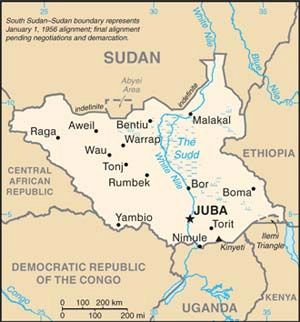
Oil fields the focus of border clashes between Sudan and South Sudan
 On late Monday evening, a military confrontation was sparked between Sudan and the newly independent South Sudan; oil infrastructure was reportedly targeted. There are reports that the Sudanese Air Force had bombed oil producing areas, which are claimed by both countries. Talks between Presidents Omar al-Bashir and South Sudan President Salva Kiir that were scheduled for later this week have been cancelled. This has been the worst hostility experienced between the two nations since the South broke away last July.
On late Monday evening, a military confrontation was sparked between Sudan and the newly independent South Sudan; oil infrastructure was reportedly targeted. There are reports that the Sudanese Air Force had bombed oil producing areas, which are claimed by both countries. Talks between Presidents Omar al-Bashir and South Sudan President Salva Kiir that were scheduled for later this week have been cancelled. This has been the worst hostility experienced between the two nations since the South broke away last July.
The issue is that, while South Sudan has most of the oil, Khartoum controls the pipelines, refineries, and export routes. The EIA explains more:
Although both countries are now independent, they remain interdependent in terms of the oil industry. About 75 percent of oil production (depending on specific field allocations) originates from the South, while the entire pipeline, refining, and export infrastructure is in the North. This situation has caused contention between the two countries over pipeline and export transit fees.
Both sides have said they do not want war, though minor clashes still continue. Until South Sudan has an alternate pipeline through Kenya, it would seem to be in its best interest to avoid aggression as much as possible since it 98% of its revenue comes from oil, but they have pledged to not restart oil production until a deal on transit rights and revenues are reached. So long as this dispute continues, the market is depriving of about 200,000 barrels of oil a day. The global price of oil is ultimately affected by this. While America does not consume any Sudanese or South Sudanese oil, we must continue to develop alternative sources so the economy is not as susceptible to price volatility.





